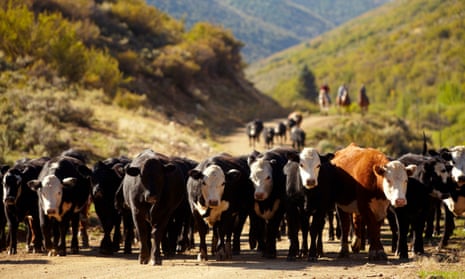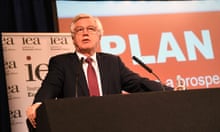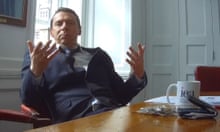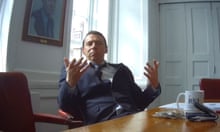The peaceful creeks and lakes of rural Oklahoma are a world away from the frenzied political fight over Brexit.
More than 4,000 miles from Westminster, this is the stomping ground of Tucker Link, an influential US business figure who appears to have taken a keen interest in the UK’s departure from the EU.
Link has global interests in chemicals, technology and property. Until recently he owned a picturesque 4,450-hectare (11,000-acre) ranch in the Ouachita Mountains with a more than 1,000-head herd of Angus cattle and state-of-the-art laboratories to assist reproduction.
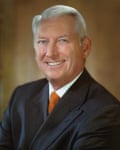
It is one of the 55,000 cattle farms in a state that is one of the biggest beef producers in the US.
Much US beef is banned in Britain under EU prohibitions against growth hormones. That could change after Brexit if ministers sign a free trade deal with the US.
Undercover investigations by Greenpeace have now shown how Link and other agriculture and energy investors are working with a leading thinktank in Westminster to promote their cause.
According to several hours of undercover footage shot by the environmental group and shared with the Guardian, the Institute of Economic Affairs (IEA) has been seeking donations from US agribusiness and has not been shy about touting what it says it can offer in return.
ProfileThe Institute of Economic Affairs
Show
The Institute of Economic Affairs was established in 1955 by admirers of the free-market economist Friedrich Hayek. Its mission involves “analysing and expounding the role of markets in solving economic and social problems”.
In July it launched a £50,000 prize for ideas about harnessing the free market to solve the UK’s housing crisis. It is established as an educational charity and does not have to declare its donors, although it is widely known to have been backed by tobacco, alcohol and oil companies, among others. It publishes reports, and organises conferences and dinners that are often attended by government ministers as well as donors. It has a high media profile, regularly supplying spokespeople to TV news channels.
Last year it spent £2.3m on its activities, which include distributing a magazine about economics to thousands of A-level students.
Its trustees include Patrick Minford, a pro-Brexit economics professor who supported Margaret Thatcher, and the hedge fund billionaire and Conservative party donor Sir Michael Hintze.
The thinktank boasted it had regular access, as often as every three or four days, to ministers. It mentioned the environment secretary, Michael Gove, and the trade secretary, Liam Fox, two people who could make a big difference to the meat eaten in post-Brexit Britain.
Dominic Raab, the new Brexit secretary, is also one of the IEA’s most vocal supporters, crediting its founders with inspiring deregulations, union reforms and business tax cuts that “saved Britain”.
They are potentially important contacts for the Oklahoman farmers who already export about $400m (£350m) worth of beef and chicken a year, but mostly to Canada and Mexico.
For the farmers this is just good business.
But at face value, all the soliciting and schmoozing by the IEA may seem at odds with its status as a registered educational charity, which should be apolitical.
The thinktank is dismissive of this. It says there is nothing untoward about seeking money in this way, or offering such introductions.
In exchanges with the Guardian which it published on its blog, the IEA said its methods were uncontroversial and it was transparent about its “relationships with parliamentarians, ministers and civil servants”.
“It is spurious to suggest the IEA is engaging in any kind of ‘cash for access’ system,” a spokesman said. “All thinktanks have relationships with government officials and politicians ... We put people in touch when we feel there is a genuine interest on both sides.”
It is now up to the Charity Commission to judge whether the IEA has retained the balance and neutrality that its status seems to require. If not, it could lose valuable tax breaks and the cachet of being a charity working for the public benefit, rather than an entity operating in the private interest.
Greenpeace intends to submit the evidence gathered in its investigation to the regulator.
This will not, however, be the only file about the IEA being assessed by the commission.
Earlier this month, it was asked to review whether the thinktank repeatedly made “one-sided and controversial contributions aimed at reducing the role of the state”.
The man who raised the issue should know the rules inside out. Andrew Purkis was, until 2010, on the board of the commission, and has previously raised concerns about the IEA, which the regulator has dismissed.
His fresh concerns focus on a recent series of tweets from the IEA Twitter account, including one that was published before the cabinet meeting on Brexit strategy at the prime minister’s country residence of Chequers in Buckinghamshire.
It read: “Remaining in a customs union could be backdoor to keeping many obligations of the single market, preventing the UK from making the most of the opportunities to reduce barriers to trade with the rest of the world.”
Q&A10 food safety risks under a free-trade deal with US
Show
A report by the Soil Association highlights 10 concerns about food safety in a post-Brexit era. These foods are currently banned in the UK:
- Chlorine-washed chicken (banned in the EU).
- Hormone-treated beef (banned in the EU).
- Ractopamine in pork (banned in the EU).
- Chicken litter as animal feed (banned in the EU). Includes the birds' faeces.
- Atrazine-treated crops (banned in the EU). Atrazine is a herbicide used on 90% of sugar cane, which can enter into the water supply and interfere with wildlife.
- Genetically modified foods (banned in the EU).
- Brominated vegetable oil (banned in the EU). BVO is used in citrus drinks; Coca-Cola announced it would stop using BVO in 2004.
- Potassium bromate (banned in the EU). A dough conditioner also banned in China, Brazil and Canada, in tests on rats it has been found to be a possible carcinogen.
- Azodicarbonamide. A bleaching agent for flour, it has been linked to an increase in tumours in rats.
- Food colourants (banned in the UK, regulated in the EU). Can lead to hyperactivity in children.
The IEA maintains it has “no corporate view” on Brexit. But its leading lights seem more opinionated.
One is Shanker Singham, the new-ish head of the IEA’s trade unit. Once a remainer, since the referendum he has been a vocal advocate for the kind of free trade deals that excite hardcore Brexiters.
Earlier this year, the Charity Commission concluded a report he had co-written on the benefits of Brexit had “failed to met the required standards of balance and neutrality”.
The report was published by another thinktank, the Legatum Institute, but earlier this year he was poached by the IEA. By all accounts, he was a star signing.
It was Singham who chaperoned Link and other Oklahomans around Westminster in May, taking them to see Steve Baker, then a Brexit minister, as well as a senior trade official and MPs, including the leader of the hardline Tory Brexiters, Jacob Rees-Mogg.
The Americans were hugely impressed with Singham, lauding him as “an inside player” and comparing his hiring by the IEA to a basketball team recruiting superstars like LeBron James or Kevin Durant.
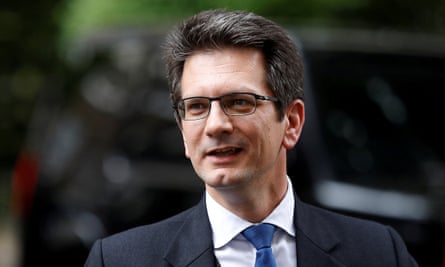
All this scrutiny means the IEA is probably facing the most turbulent period since 1955, when it was founded by admirers of the radical economist Friedrich Hayek.
Hayek believed state planning was leading to tyranny and the only salvation was the free market. And it is this guiding philosophy, as well as an annual spend of £2.3m, that has put the IEA in the vanguard of thinktanks promoting a hardline Brexit.
The IEA has made no secret that it wants the UK to strike free trade deals around the world, not least with the US. It is more coy about the identity of its donors, which it says it has no legal obligation to disclose.
In an effort to find out more about how it is attempting to influence the debate on Brexit, and the people who fund it, a Greenpeace investigator posed as a lobbyist contracted by investors in US agriculture seeking to open up UK markets.
Damian Kahya, the editor of Unearthed, an investigations unit set up by Greenpeace, said the decision to go undercover was not one “we would ever have taken lightly”.
“Our initial research and reporting indicated that secretly funded thinktanks have been working behind the scenes and alongside UK ministers to use Brexit to lower environmental standards.”
The Copenhagen meeting
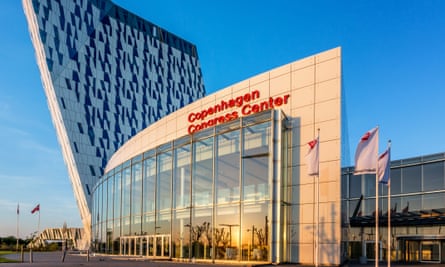
In May, the investigator attended the Liberty Forum conference in Copenhagen, a gathering of rightwing thinktanks from across the world.
There, he met Michael Carnuccio, the director of the E Foundation, which represents Link and other Oklahoma business figures keen for a free trade deal.
According to the recordings, Carnuccio explained how the E Foundation was planning to pour cash into the IEA, including through a US membership organisation that channels money from US donors anonymously.
He told the investigator that his organisation was planning to raise between $250,000 and $400,000 to campaign on Brexit, most of which it would “ship over to the UK”.
Agriculture, energy and aerospace business people had already donated, Carnuccio claimed.
He was enthusiastic about the fact IEA had been helping to draft a memorandum of understanding (MoU) that set out a potential post-Brexit trade between the state of Oklahoma and the UK.
Carnuccio explained how he and Link had come to the UK in May, and Singham had taken them to meet a senior official in the Department for International Trade (DIT), where they agreed on the need for the document.
“(The official) turned to Shanker and he said, can you help send us some language?” Carnuccio was recorded saying.
He said Singham was “drafting this stuff up like in the middle of the meeting”.
The director of the IEA, Mark Littlewood, was also at the Copenhagen conference. Over drinks outside the main hall, he explained to the investigator the benefits of having such a memorandum.
It would, he said, bestow “first mover advantage” on the state of Oklahoma which could go “storming down Westminster saying, I want to sign a free trade deal with you fuckers”.
Asked about these exchanges, the IEA told the Guardian the MoU was only meant to be illustrative and to “further public understanding” about free trade.
“We believe this is an effective way to dispel many of the myths surrounding the free trade debate,” a spokesperson said. “This is in accordance with the IEA’s mission.” The DIT said no MoU was discussed.
Later in the May conversation, Littlewood went on to describe his access to senior Conservatives as “a good B-minus”, while Singham was “a very strong A”.
The IEA director also boasted that Singham had been “writing Gove and Johnson’s script” on the subject of the UK leaving the customs union.
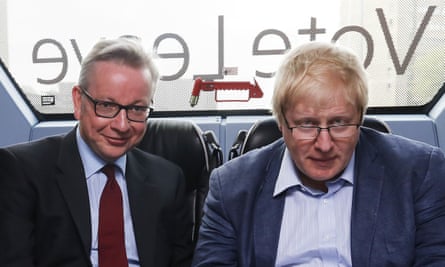
Singham, he said, was “unbelievably well connected”, and “such an expert he’s able to get into ministers and cabinet ministers like that”.
The IEA appeared to backtrack when asked about these claims.
It said Singham was “quite clearly not ‘writing Gove’s script’ given the significant divergence in their opinions” on issues such as leaving the customs union.
“There is nothing untoward about thinktanks having a collaborative approach with politicians,” the IEA said. “Policymakers need to be well-advised … [there is] an enormous job of education to be done on trade policy, in part because the UK hasn’t had one for over 40 years.”
A spokeswoman for Baker said the meeting between Singham and the Oklahomans was “in his political capacity to discuss trade relations between the two countries”.
She said Baker only had one meeting at the IEA and said he only ever had meetings “on merit”, adding: “We would not want any ambiguity on this point.”
A source close to Johnson said: “Boris has not been introduced to, or invited to meet, any donors by the IEA. He fully respects and admires the work of Mr Singham but has only had very limited contact with IEA trade team.”
The London meeting
Greenpeace continued its investigation in June, when its undercover investigator met Littlewood and Singham at the London headquarters of IEA.
The meeting was to discuss what the investigator’s fictional US client might get in return for donating to the thinktank.
The discussion appeared to illuminate another side to what the IEA could offer.
When the investigator said his clients hoped for the same kind of “VIP” and “red carpet” access to Westminster described to him by the Oklahoma delegation, Littlewood said he was comfortable facilitating “business interests”.
Singham added: “We have a sort of core set of beliefs about what free markets and free trade want to deliver for people and … there are people out there who align with those beliefs and from our perspective if they do well because those things happen then that’s fine with us.”
After Singham had left the room, the investigator discussed his client’s possible backing for an IEA report about genomics, chemicals and technology in post-Brexit farming.
“Michael Gove is very keen for this [report] to happen,” said Littlewood, adding that the initial idea was to “get these ideas in the blood stream of Defra,” referring to the Department for Environment, Farming and Rural Affairs.
He said: “I’m really plugged into and excited about projects where I know there is ministerial interest otherwise you’re pushing water uphill you know, if Michael Gove had actually said: ‘Do this report if you fucking want but it’s gonna go straight into my bin and nobody at Defra is ever going to read it you utter mentalists.”’
He claimed Liam Fox, the international trade secretary, had previously asked the IEA for a report on how much a free trade deal could add to Britain’s GDP, and he said that if a report only had “an audience of one”, if it was a cabinet minister, that was “fantastic”.
The Guardian asked Fox about the claim, but he declined to comment.
In his remarks to the investigator, Littlewood stressed the IEA was not a lobbyist, and there were limits to how far the thinktank would go.
“If you came to us and said the client wants you to write a paper that will conclude that the most important thing is that Oklahoman beef needs to enter the British market … we won’t take these conclusions and package them up,” he said.
On the other hand, Littlewood assured the would-be donor: “There is no way this report is going to say the most important thing we need to do is keep American beef out of our market in order to prop up our beef farmers, in fact exactly the opposite.”
In statements to the Guardian, the IEA insisted it does not accept commissions from ministers to write reports, though it does accept money from donors to fund them.
It said it had complied with Charity Commission rules and was confident that its output was “independent and free from conflict of interest”.
“We provide analysis without favour so that people can be as educated as possible on these complex issues,” it said.
The IEA said it did not recognise the sums of money being suggested by the E Foundation, and had not received any cash from US businesses in relation to its work on trade and Brexit.
The Guardian contacted Carnuccio and Link about their dealings with the IEA.
A spokesperson for the E Foundation replied: “The informal conversation enlightened us on possible mutually beneficial endeavors in the future between United Kingdom and Oklahoma.
“Any suggestions the conversations were about something other than constructive business and research pursuits would be completely misguided.”
